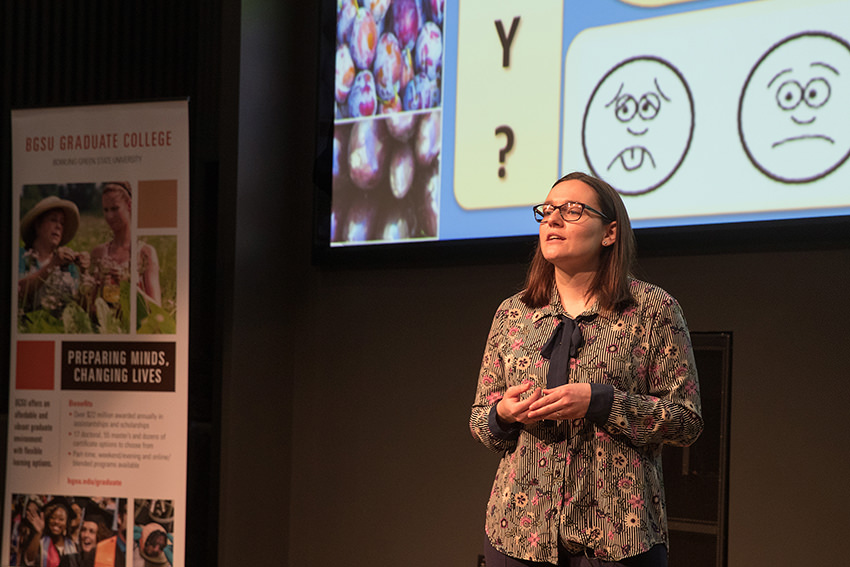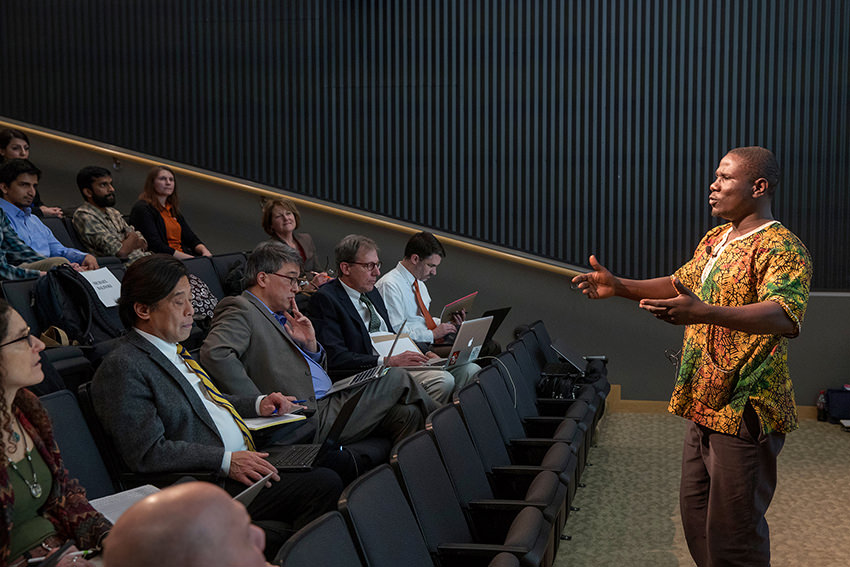BGSU graduate students share theses in three minutes
Students vie for prizes in University's first Three-Minute Thesis Competition

By Bonnie Blankinship
“It felt like it went really fast,” said a slightly breathless Nikolai Tcyrulnikov. “I know it was the three minutes, but when I was up there it seemed to go by much faster than that.”
Tcyrulnikov, a doctoral student in photochemical sciences, had taken the challenge of attempting to explain his thesis topic, “Pyridinium Salts: From Photoinduced Through-Space Electron Delocalization to Novel Spontaneous Reactions Causing Thermal DNA,” to a lay audience — in three minutes. He was one of 17 graduate students who participated Feb. 7 in BGSU’s first-ever Three-Minute Dissertation Competition, or 3MT®.
Not only did they have a mere three minutes, the competitors could use just a single, static slide, with no rap, music, poetry, costumes or other props. They brought energy, and sometimes humor, to their pithy talks, which were judged by a panel of faculty and administrators. Audience members voted for the People’s Choice Award.
Developed by The University of Queensland, the fast-paced competition “hones students’ academic, presentation, and research communication skills. For some, it helps to develop an ‘elevator speech’ for their research,” according to the Graduate College. Cash prizes were given to the first-, second- and third-place winners, along with a People’s Choice Award.
 Biological sciences graduate student Kevin Oyale Chiteri explains his thesis to a panel of judges.
Biological sciences graduate student Kevin Oyale Chiteri explains his thesis to a panel of judges.
“All 17 presenters were great. For our first competition, I was so pleased,” said Dr. Peggy Booth, Graduate College dean. “Other institutions I know of in Ohio of similar size have not had such a successful quantity and quality of competitors. It is a very difficult thing to take a complicated research subject that one normally is able to present to disciplinary experts in perhaps 30 minutes and instead present to a general audience in three minutes. They all took on the challenge well.”
The topics ranged widely, from the sciences to the humanities. Aju James, a student in American culture studies, presented “Stand-up Comedy in Mumbai as a Site of Struggle over Globalization and National Identity.” He spoke about how middle class people in urban spaces are using comedy to challenge hierarchies of class and gender by saying, in effect, “We’re just like you but a little bit different in small but cute ways,” drawing laughter from the audience.
Graeme Wilson’s slide showed President Donald Trump flanked by images of the heroes of two highly popular shows to illustrate his thesis “Angry White Men: How ‘Breaking Bad’ and ‘The Walking Dead’ Predicted the Trumpian Zeitgeist.”
Samantha Nesdiol, in industrial/organizational psychology, took second place with her lively description of her research topic “Why Does the Public Sector Resist Unproctored Internet Testing?” After analyzing what types of web-based testing people, and especially human resources professionals, are most and least trustful of, she predicted that perhaps in the future we might be able to apply for jobs from home “in our pajamas.”
Taking first place was Kacie Pummill, speech-language pathology, for “Comprehension and Phenomic Mismatch in Disordered Speech.” Third place went to clinical psychology student Emily Ferrell for “Risk Factors for Disordered Eating among Military Personnel.” Brian Timm in sociology won the People’s Choice Award for “The Long Reach of Delinquent Networks in Late Adolescence on Criminal Activity in Early Adulthood.”
Updated: 02/15/2019 01:58PM
